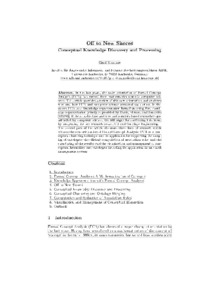Preprint

Off to new shores
(Conceptual knowledge discovery and processing)
Zusammenfassung
In the last years, the main orientation of Formal Concept Analysis (FCA) has turned from mathematics towards computer science. This article provides a review of this new orientation and analyzes why and how FCA and computer science attracted each other. It discusses FCA as a knowledge representation formalism using five knowledge representation principles provided by Davis, Shrobe, and Szolovits [DSS93]. It then studies how and why mathematics-based researchers got attracted by computer science. We will argue for continuing this trend by integrating the two research areas FCA and Ontology Engineering. The second part of the article discusses three lines of research which witness the new orientation of Formal Concept Analysis: FCA as a conceptual clustering technique and its application for supporting the merging of ontologies; the efficient computation of association rules and the structuring of the results; and the visualization and management of conceptual hierarchies and ontologies including its application in an email management system.
Zitieren
@article{urn:nbn:de:hebis:34-2009030926583,
author={Stumme, Gerd},
title={Off to new shores},
year={2003}
}
0500 Oax
0501 Text $btxt$2rdacontent
0502 Computermedien $bc$2rdacarrier
1100 2003$n2003
1500 1/eng
2050 ##0##urn:nbn:de:hebis:34-2009030926583
3000 Stumme, Gerd
4000 Off to new shores
:Conceptual knowledge discovery and processing / Stumme, Gerd
4030
4060 Online-Ressource
4085 ##0##=u http://nbn-resolving.de/urn:nbn:de:hebis:34-2009030926583=x R
4204 \$dPreprint
4170
5550 {{Formale Begriffsanalyse}}
7136 ##0##urn:nbn:de:hebis:34-2009030926583
<resource xsi:schemaLocation="http://datacite.org/schema/kernel-2.2 http://schema.datacite.org/meta/kernel-2.2/metadata.xsd"> 2009-03-09T13:54:51Z 2009-03-09T13:54:51Z 2003 urn:nbn:de:hebis:34-2009030926583 http://hdl.handle.net/123456789/2009030926583 10151045 bytes application/pdf eng Urheberrechtlich geschützt https://rightsstatements.org/page/InC/1.0/ Wissenserwerb 004 Off to new shores Preprint In the last years, the main orientation of Formal Concept Analysis (FCA) has turned from mathematics towards computer science. This article provides a review of this new orientation and analyzes why and how FCA and computer science attracted each other. It discusses FCA as a knowledge representation formalism using five knowledge representation principles provided by Davis, Shrobe, and Szolovits [DSS93]. It then studies how and why mathematics-based researchers got attracted by computer science. We will argue for continuing this trend by integrating the two research areas FCA and Ontology Engineering. The second part of the article discusses three lines of research which witness the new orientation of Formal Concept Analysis: FCA as a conceptual clustering technique and its application for supporting the merging of ontologies; the efficient computation of association rules and the structuring of the results; and the visualization and management of conceptual hierarchies and ontologies including its application in an email management system. open access Conceptual knowledge discovery and processing Stumme, Gerd Extern Auch erschienen in: International journal of human - computer studies. Amsterdam : Elsevier, Vol. 59 (2003), No. 3, S. 287-325 Formale Begriffsanalyse </resource>
Die folgenden Lizenzbestimmungen sind mit dieser Ressource verbunden:
Urheberrechtlich geschützt

